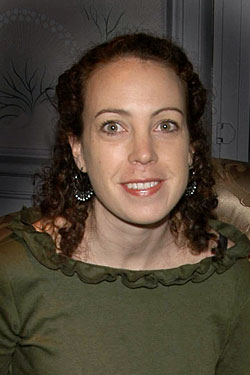
In the dystopian future New York City of Ann Marie Healy’s new play What Once We Felt, men are extinct, babies are delivered in the mail, and books are about to become obsolete. Healy just graduated from Brown’s MFA playwriting program in 2008 and already has Lincoln Center producing her dark comedy (through its LCT3 new-play initiative). Ken Rus Schmoll’s production opened last night at the Duke Theater on 42nd Street. It’s a big move uptown for a young downtown playwright, a member of the 13P playwrights’ collective. Vulture spoke to Healy about health care, wacky literary agents, and how working for a prominent futurist inspired her to write science fiction.
In addition to writing plays, you’ve worked for several years as a writer for Andrew Zolli, the curator of PopTech, a major yearly new-technology and futurism conference. How did that work influence this play?
He does a lot of speaking and writing at the vortex of technology, design, and social innovation. This is going to sound very wonky, but the way we have access to information now is completely unsurpassed, whether that’s our own personal genetic information, or information about books that no longer exist, but we don’t necessarily gain any insight or wisdom from that access.
You might know 87 percent of your genetic code …
Right, and what do you really do with that?
The world of your play is divided into Keepers and Tradepacks, the genetic haves and have-nots.
It started with the health-care debate, and people with preexisting conditions being denied health care. In this world, the information about what diseases people had and their preexisting conditions became part of a database, so that the society began to divide into two parts. There’s the world of the Keepers, who are supposedly perfectly healthy, and they’re allowed to procreate and they’re allowed to live the life of the Haves, and there’s the part of the society that has been genetically sequenced, and there’s no indication that they will be sick, they’ve just been systematically marginalized.
And more or less exterminated in the sense that they’re not allowed to have children.
Yeah. And so it’s a kind of, the sick get sicker and the well live even more high off the hog, so the discrepancy between the well and unhealthy grows to this kind of, like, horrifying chasm, which is where we see the play when it starts.
And where have all the men gone?
Men have evolved out of existence. Everybody’s genetics have been sequenced and they’re all on some big collective database. And reproduction happens just by a woman or two women downloading, you know, a kind of Boggle game of healthy genes.
A lot of What Once We Felt takes place in the publishing business, as Macy, the heroine, has written the world’s last book. That’s an industry that has been female-driven for a long time.
I was talking to friends of mine who worked in publishing and hearing funny stories. I don’t know if it’s a term that everybody uses or not, but a couple of friends have said, “Oh, you know, she’s a nice young girl from publishing,” which I always thought was so funny. I finally came to understand that it describes these very smart, polished, well-put-together women. It’s really complimentary, but it also said something about the culture, which is that you know these are women who probably came to publishing with a love of literature and who are now in an environment you have to negotiate a commercial marketplace, and also maintain a stature as a nice young woman with manners.
Astrid, Macy’s agent, is in a long line of wacky onstage agents — seen most recently in Julie White’s Tony-winning role in The Little Dog Laughed.
Yes! I have a playwriting agent and a literary agent and they are some of the most pleasant people I know. Astrid must have seriously come from our cultural conversation about agents, this weird Jungian archetype. Because to be honest, I have never actually met an agent this daffy.
After something this complicated, is your next play just going to be a couple of people talking about their problems?
[Laughs] Totally, that’s exactly what I’m planning. A two-person play, and they’re going to be sitting at bar stools.




